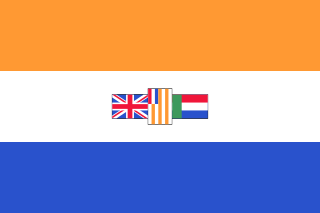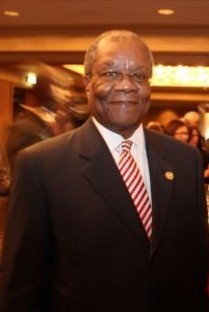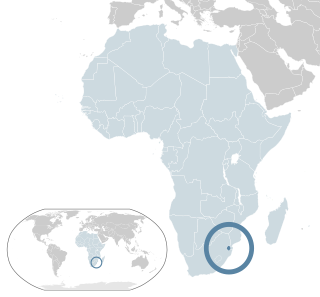Related Research Articles

Eswatini, formally the Kingdom of Eswatini, also known by its former official name Swaziland and formally the Kingdom of Swaziland, is a landlocked country in Southern Africa. It is bordered by Mozambique to its northeast and South Africa to its north, west, south, and southeast. At no more than 200 km (120 mi) north to south and 130 km (81 mi) east to west, Eswatini is one of the smallest countries in Africa; despite this, its climate and topography are diverse, ranging from a cool and mountainous highveld to a hot and dry lowveld.

Artifacts indicating human activity dating back to the early Stone Age have been found in the Kingdom of Eswatini. The earliest known inhabitants of the region were Khoisan hunter-gatherers. Later, the population became predominantly Nguni during and after the great Bantu migrations. People speaking languages ancestral to the current Sotho and Nguni languages began settling no later than the 11th century. The country now derives its name from a later king named Mswati II. Mswati II was the greatest of the fighting kings of Eswatini, and he greatly extended the area of the country to twice its current size. The people of Eswatini largely belong to a number of clans that can be categorized as Emakhandzambili, Bemdzabu, and Emafikamuva, depending on when and how they settled in Eswatini.

Mswati III is the Ngwenyama (King) of Eswatini and head of the Swazi royal family. He heads an absolute monarchy, as he has veto power over all branches of government and is constitutionally immune from prosecution.

The Swazi or Swati are a Bantu ethnic group native to Southern Africa, inhabiting Eswatini, a sovereign kingdom in Southern Africa, and South Africa's Mpumalanga province. AmaSwati are part of the Nguni-language speaking peoples whose origins can be traced through archaeology to East Africa where similar traditions, beliefs and cultural practices are found.

KaNgwane was a bantustan in South Africa, intended by the apartheid government to be a semi-independent homeland for the Swazi people. It was called the "Swazi Territorial Authority" from 1976 to 1977. In September 1977 it was renamed KaNgwane and received a legislative assembly. After a temporary suspension of its homeland status during 1982, the legislative assembly was restored in December 1982. KaNgwane was granted nominal self-rule in August 1984. Its capital was at Louieville. It was the least populous of the ten homelands, with an estimated 183,000 inhabitants. Unlike the other homelands in South Africa, KaNgwane did not adopt a distinctive flag of its own but flew the national flag of South Africa.

Lobamba is a place in Eswatini located in between Eswatini's two main cities, Mbabane and Manzini.

Prince Barnabas Sibusiso Dlamini was a Swazi politician who served as Prime Minister of Eswatini, from 1996 to 2003 and again from October 2008 to September 2018.

Lesbian, gay, bisexual, transgender, and queer (LGBTQ) people in Eswatini have limited legal rights. According to Rock of Hope, a Swati LGBTQ advocacy group, "there is no legislation recognising LGBTIs or protecting the right to a non-heterosexual orientation and gender identity and as a result [LGBTQ people] cannot be open about their orientation or gender identity for fear of rejection and discrimination." Homosexuality is illegal in Eswatini, though this law is in practice unenforced. According to the 2021 Human Rights Practices Report from the US Department of State, "there has never been an arrest or prosecution for consensual same-sex conduct."
HIV/AIDS in Eswatini was first reported in 1986 but has since reached epidemic proportions. As of 2016, Eswatini had the highest prevalence of HIV among adults aged 15 to 49 in the world (27.2%).

Mbabane Highlanders is an Liswati football club based in Mbabane. They have won more national titles than any other club, although their most recent league title was in 2001.
Prostitution in Eswatini is illegal, the anti-prostitution laws dating back to 1889, when the country Eswatini was a protectorate of South Africa. Law enforcement is inconsistent, particularly near industrial sites and military bases. Police tend to turn a blind eye to prostitution in clubs. There are periodic clamp-downs by the police.
Prince Sozisa Dlamini of Swaziland was Chief of Gundvwini. He became the Authorized Person of Swaziland from 1982 to 1985 after the death of King Sobhuza II, and in 1983 was briefly the acting Regent of the country, after he deposed Queen Dzeliwe. From 1983 he was Authorized Person to the new Queen Regent, Ntfombi, with greater powers. Although lacking the title, he was for most purposes the de facto ruler of the country. He fell from power in July 1984, after being accused of planning a coup, and was suspended as Authorized Person until Queen Ntfombi terminated his appointment on 1 November 1985.
Mbabane Government Hospital is the national hospital in Mbabane, Eswatini with 500 beds. Nkosazana Dlamini-Zuma worked at this hospital at a paediatric nurse in the 1980s. In 2007, the Minister for Health and Social Welfare, Njabulo Mabuza, banned the media from entering the hospital.
Charles Myeza is a Swazi politician and former police officer.

Eswatini–India relations refers to the international relations that exist between Eswatini and India. India also maintains a resident High Commission in Mbabane established on 13 August, 2019. Eswatini does not have a diplomatic mission in India.

Kwati Candith Mashego-Dlamini is a South African politician from Mpumalanga. She served as the Deputy Minister of International Relations and Cooperation from May 2019 until June 2024, and she also served as Deputy Minister of Rural Development and Land Reform from 2014 to 2019.

The history of the Jews of Eswatini, formerly Swaziland.
Mduduzi Bacede Mabuza is a Swazi politician and pro-democracy activist. Formerly a member of the House of Assembly of Eswatini, he was arrested during the 2021 protests, and in 2024 was sentenced to 25 years in prison on charges of terrorism, sedition, and murder, in a trial condemned by national and international human rights organisations.
Jabulani Clement Mabuza is an Eswatini politician and businessman serving as the Speaker of the House of Assembly of Eswatini since October 2023.
References
- ↑ "Times Of Swaziland". www.times.co.sz. Retrieved 2018-07-09.
- 1 2 "SWAZI POLL - WINNERS AND LOSERS:Njabulo Mabuza left scratching his head". Times Sunday. 21 September 2008. Retrieved 21 March 2012.
- ↑ So this is democracy?: report on media freedom in Southern Africa. Media Institute of Southern Africa. 2007. p. 93. ISBN 978-99916-62-15-2 . Retrieved 21 March 2012.
- ↑ "Swaziland's parliament goes on 'strike'". Afrol. Retrieved 21 March 2012.
- ↑ "Njabulo's appeal struck off after failure to pay E200". Times of Swaziland . 17 November 2011. Retrieved 21 March 2012.